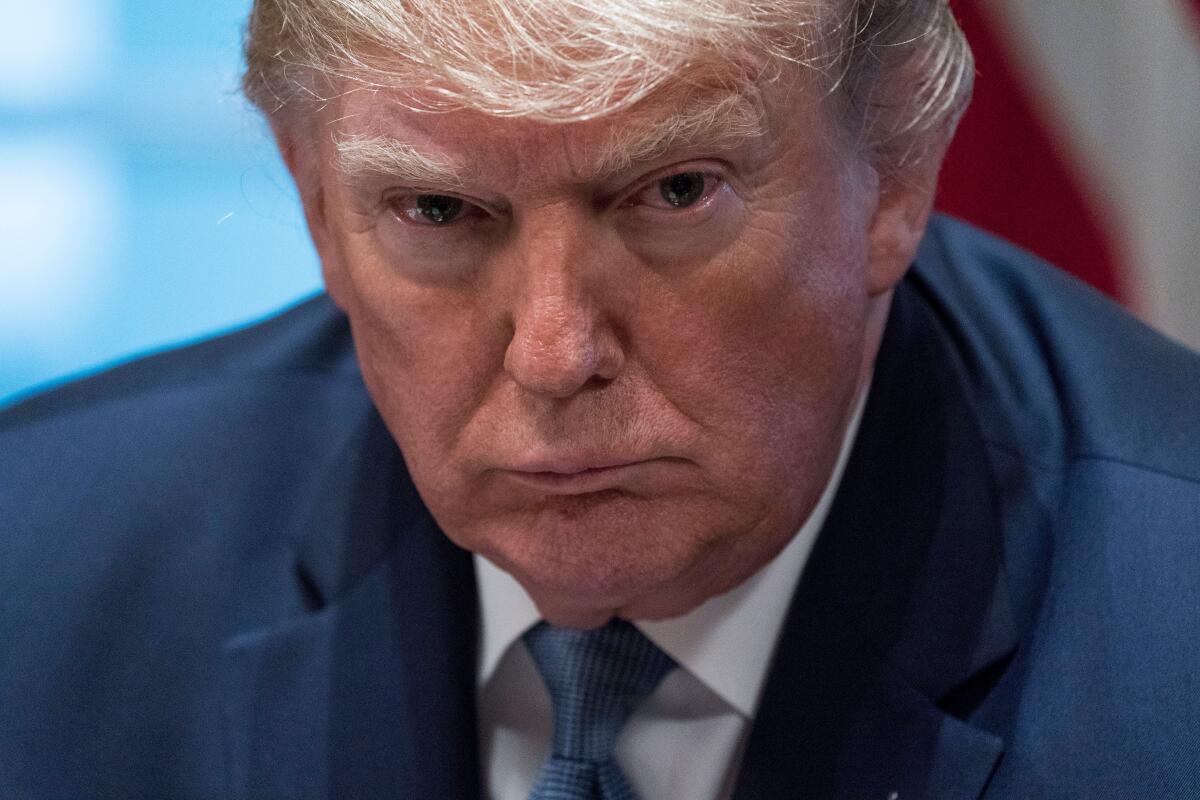Report sharply criticizes FBI but finds no partisan bias in Russia probe

WASHINGTON — The Justice Department’s internal watchdog sharply criticized the FBI on Monday for its clandestine surveillance of a former Trump campaign advisor suspected of working with Russian intelligence, describing a systematic breakdown and numerous errors in a politically charged investigation during a presidential campaign.
Inspector General Michael Horowitz said his investigators uncovered no evidence that the mistakes were intentional or influenced by political bias, as President Trump has repeatedly alleged. He also concluded that the FBI had proper legal and factual justification for launching the counterintelligence probe in 2016.
The 434-page report was released as the House Judiciary Committee conducted a contentious impeachment hearing, and Trump and his allies seized on the withering criticism of the FBI to claim full vindication — and overstate the conclusions.
“This was an overthrow of government, this was an attempted overthrow and a lot of people were in on it and they got caught, they got caught red handed,” Trump told reporters at the White House.
“They fabricated evidence and they lied to the courts and they did all sorts of things to have it go their way,” he added.
The president has long accused the FBI of illicitly spying on his campaign, blaming what he calls “deep state” opposition inside the government to his presidency. Although the report did not support those explosive claims, it revealed how the FBI sent confidential informants to collect information.
Horowitz said the FBI did not place informants inside the Trump campaign, but it used them to speak to a high-ranking Trump campaign official and at least two Trump campaign advisors. The informants recorded those conversations.
The report was a black eye for the nation’s premier law enforcement agency as it conducts classified national security investigations. Horowitz’s team uncovered 17 “significant errors or omissions” resulting from “case agents providing wrong or incomplete information” to Justice Department attorneys.
In particular, Horowitz offered a scathing rebuke of how FBI agents investigated Carter Page, a former foreign policy advisor to the Trump campaign, and convinced the nation’s foreign intelligence surveillance court to authorize secret surveillance of him.
The inspector general, who provides independent oversight, found that FBI agents withheld information from Justice Department attorneys that was beneficial to Page, and undermined the veracity and reliability of a key source of information.
It also repeatedly faulted FBI agents for relying in part on the so-called Steele dossier, a compendium of unverified allegations about Trump and Russia collected by a former British intelligence officer.
“We are deeply concerned that so many basic and fundamental errors were made by three separate, hand-picked investigative teams,” Horowitz wrote. He referred “all employees” involved in obtaining the warrants for disciplinary review.
The report quickly became powerful ammunition for Trump’s defenders.
In a statement, Atty. Gen. William Barr said Horowitz made clear “that the FBI launched an intrusive investigation of a U.S. presidential campaign on the thinnest of suspicions that, in my view, were insufficient to justify the steps taken.”
Barr said the evidence collected by the FBI in its pursuit of Page was “consistently exculpatory” and yet “the investigation and surveillance was pushed forward for the duration of the campaign and deep into President Trump’s administration.”
John Durham, a U.S. attorney appointed by Barr to investigate the origins of the Russia investigation, said he disagreed with Horowitz’s chief finding: that the investigation had been properly predicated, meaning agents had legal and factual justification to open it.
“Based on the evidence collected to date, and while our investigation is ongoing, last month we advised the Inspector General that we do not agree with some of the report’s conclusions as to predication and how the FBI case was opened,” Durham said in a statement.
FBI Director Christopher Wray praised the “constructive criticism” in the report, noting that the bureau cooperated with the inspector general and accepted his findings. Wray said he had ordered more than 40 corrective steps in response.
Wray said some FBI personnel “did not comply with existing policies, neglected to exercise appropriate diligence, or otherwise failed to meet the standard of conduct that the FBI expects of its employees — and that our country expects of the FBI.”
Democrats defended the FBI and said the report proved federal agents had not conspired for political reasons to investigate Trump.
Rep. Jerrold Nadler, chairman of the House Judiciary Committee that is spearheading the impeachment inquiry, said the report debunked conspiracy theories about the FBI deliberately seeking to block Trump’s election.
“Those discredited conspiracy theories were attempts to deflect from the President’s serious and ongoing misconduct, first urging Russia and now extorting Ukraine into interfering with our elections to benefit himself personally and politically,” Nadler said in a statement.
In 2018, Horowitz began investigating how the FBI opened its counterintelligence investigation, code-named Crossfire Hurricane, into whether associates of Trump and his campaign coordinated with the Russian government to influence the election.
His investigators reviewed more than 1 million documents and conducted more than 170 interviews.
He said the case involved “one of the most sensitive FBI investigations,” had been briefed to senior FBI officials, that it related to an ongoing presidential campaign, and “those involved with the investigation knew that their actions were likely to be subjected to close scrutiny.”
The FBI bungling was so extreme that it prodded the inspector general to launch an audit of the bureau’s FISA procedures, referring to the Foreign Intelligence Surveillance Act.
Horowitz largely confirmed evidence collected by special counsel Robert S. Mueller III — that the FBI probe began after an Australian diplomat in London reported in mid-2016 that a Trump campaign advisor, George Papadopoulos, had disclosed that a suspected Russian agent had suggested Moscow could help Trump by releasing damaging information on Democratic presidential candidate Hillary Clinton.
At first, investigators relied on gathering information from public sources and using informants to record conversations with Papadopoulos and Page, who had multiple contacts with Russian officials.
FBI agents and lawyers, as well as Justice Department prosecutors, debated whether to seek warrants from the secretive FISA court, which reviews and approves domestic surveillance of suspected terrorists and spies, to gather information about Page and Papadopoulos.
Lawyers squelched the move, saying the FBI did not have enough information to seek a warrant.
That calculus changed in September 2016 when the FBI obtained information from Christopher Steele, a former British spy who had been hired by a political research firm to dig up information about Trump and his associates’ dealings with Russia. The work by the firm, Fusion GPS, was largely funded by Democrats.
Steele produced a series of reports examining those alleged interactions. The so-called Steele dossier helped tip the scales in favor of obtaining surveillance warrants, the report concluded.
The FBI obtained a FISA warrant in October 2016 for surveillance on Page, and subsequently was approved for three extensions, with the final warrant granted in June 2017.
The FBI did not obtain a foreign intelligence warrant for Papadopoulos or two other targets of the probe: Michael Flynn, a campaign advisor, and Paul Manafort, the former campaign chairman. Papadopoulos and Flynn later pleaded guilty to lying to the FBI and Manafort was convicted at trial of financial crimes.
Despite FBI guidelines, agents did not disclose problems with Steele’s information that should have been presented to the Justice Department and the FISA court, the report found.
“FBI personnel fell far short of the requirement in FBI policy that they ensure that all factual statements in a FISA application are ‘scrupulously accurate,’” the report found.
It noted “multiple instances” where FBI assertions in the FISA applications were “inaccurate, incomplete, or unsupported by appropriate documentation, based upon information the FBI had in its possession at the time the application was filed.”
In later applications to renew the warrant, the FBI left out information that undermined the credibility of sources, including Steele, and did not better clarify the “political origins” of Steele’s reports to the FBI.
Although the inspector general found no evidence that the agents engaged in intentional misconduct, he wrote he did not “receive satisfactory explanations for the errors or problems we identified.”
The first warrant was obtained a few weeks after Page disclosed he had left his job as an unpaid foreign policy advisor to the Trump campaign amid controversy over his contacts with Russian officials.
Page was not charged with any crime.
In a statement Monday night, he said every American should be troubled by the FBI misconduct.
“This unchecked surveillance power is a threat to liberty, and there must be a complete reckoning here,” he said.
More to Read
Get the L.A. Times Politics newsletter
Deeply reported insights into legislation, politics and policy from Sacramento, Washington and beyond. In your inbox three times per week.
You may occasionally receive promotional content from the Los Angeles Times.











